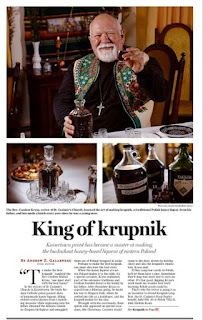Easter Bread and Cross Bread
What's in the Basket? Why?
NEXT: The Bitter Herb
Eating Holy Communion Bread gets us there.
Reverence for bread is central to our ancestors’
family spirituality. One of St Casimir’s deceased members used to tell her
children, “Never waste bread, you may need it one day.” She and her family
survived a Siberian death camp. The Polish poet, Cyprian Norwid wrote:
I yearn for the land where people raise a piece
of bread which has fallen to the floor
and kiss it, because it is a gift of heaven.
and kiss it, because it is a gift of heaven.
The way you show respect for this heavenly gift
is family spirituality. Our reverence need to be informed by the way
we respect and acknowledge Jesus present in the Holy Eucharist. Do you stop by
your pew before entering it, look toward the church’s heavenly bread box,
called a tabernacle, and genuflect with your heart focused on that most unique
place on the high altar. How do we act when the priest consecrates a
mere wafer into God’s Body? Do you teach others by example to quietly kneel,
gently fold your hands, bowing your head when the consecrated host
is raised, bells ring, and incense rises among candles?
Do you say in your heart, “My Lord and My God!
Acknowledging the greatest miracle on earth? Do the youngest in your family do
this?
The transfigured “Bread of heaven” in a mystical
way transforms every slice and loaf we consume. Grandmothers once saved crumbs,
giving them to the birds in their yard, not throwing them in the
garbage. Do you ever sign a loaf with a cross (see slicing below) or
break a slice saying in your heart: They recognized Him (Risen Jesus)
in the breaking of the bread (Lk 24:35). Is your house ever blessed
with the aroma of baking bread? If so, do you ever make a sign of the Cross
over a risen loaf before placing it in the oven?
A Polish soldier who lost his leg in war,
later became a painter and founded of a religious order of mean and women who
live the lives of street people, used to tell his followers, "Be as good
as bread." He began to fight the war on poverty, by feeding the hungry,
giving them a bath, fresh clothes, and teaching them a skill so they could find
a job. His name was St Albert Chmielowski of Kraków, Poland, one of St John Paul's
favorite saints.
Do you show others to reverence bread, “by
saying you need to eat all you place on your plate?” Is there a Cross bread
loaf in your blessing basket. How do you share it at home on Easter Sunday. How
do you reverence family members with custom-made wishes while sharing the
Christmas Wafer or opłatek? Do you speak to them from your heart?
Did you ever welcome a special guest with
bread and salt? Or as a proud parent welcome guests to your child’s wedding
reception with bread and salt?
Eight PolAm Action-Prayers over Bread
1) Before placing risen loaves into an oven, bakers, sign each loaf with a Cross.
2) Slicing a round loaf, the head of the house takes a knife & signs the bottom of the bread with a Cross.
4) Angel-Bread, called opłatek, is shared by families on Christmas Eve, accompanied by authentic, personalized, custom-made, wishes that dreams be fulfilled by the New-born Child.
5) Parents of the bride and groom welcome their children and all guests with a round loaf of bread and salt, expressing that they share in the blessings of eternal faithfulness and love. They often quote Sacred Scripture: Love bears all things, forgives all things…”
6) Meal hospitality, Poland’s 11th Commandment begins with sharing of a round loaf of bread and salt. This fellowship ritual welcome determined the first King of Poland. Here are the two angelic guests at the home of the Kolodziej and his wife Rzepicha (far right with mixing bowl and child.
7) The ornamental korowaj, or ritual, harvest festival bread is shared with harvesters and guests. This loaf is bedecked Eucharistic symbols: a Host, grapes, wheat, as well as roses, & doves.
8) The renowned Cross Bread along with the Butter Lamb form the central ritual foods of the Easter Basket. The actual text of the Polish blessing relates the Crossed loaf with Jesus, the bread of heaven and His multiplication of the loaves and fishes. The Lamb, a reminder of the Wedding Feast of the Lamb in the Book of Revelation (19:9), points directly to the Blessed Easter Breakfast to the Eucharistic Table and the breaking of the Bread.
NEXT: The Bitter Herb









Comments
Post a Comment